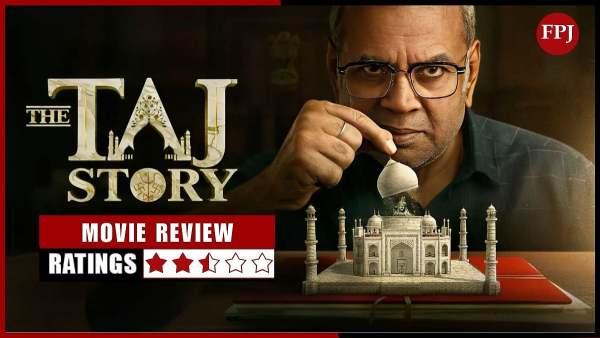
Director Tushar Amrish Goel, who co-wrote the screenplay with Saurabh M. Pandey (also the dialogue writer), tries too hard to drive home the core argument — that the Taj Mahal was built on the ruins of a palace belonging to King Jai Singh and acquired by Shah Jahan
Title: The Taj Story
Director: Tushar Amrish Goel
Cast: Paresh Rawal, Namit Das, Brijendra Kala, Zakir Hussain and Amrita Khanvilkar
Where: In theatres near you
Rating: 2.5 stars
Propaganda films have had an uneven run in Indian theatres. The Taj Story, starring Paresh Rawal as tour guide Vishnu Das, is another legal drama-meets-propaganda film that raises interesting questions but falls short of providing gripping answers. As far as storytelling goes, this one isn’t told well.
Vishnu Das (Paresh Rawal) is a tour guide who makes a living narrating popular stories of the Taj Mahal — Mughal emperor Shah Jahan’s monument to love and one of the seven wonders of the world. When he decides to contest the election for president of the Guides Association, he struggles to answer a journalist’s probing questions about the monument’s history. Over drinks with friends, he confesses that most of the tales he tells tourists are not true. His confession is filmed, goes viral, and destroys his reputation, leading to suspension from duty and social ostracism.
Das is humiliated when his son Avinash (Namit Das) faces the fallout of his father’s words. Seeking redemption, he turns to local lawyer Shashikant (Brijendra Kala), who initially supports him but later backs out, advising Das to file a PIL instead. The court accepts his plea, setting off a slow, contentious legal battle against opposing counsel Anwar Rashid (Zakir Hussain). Both sides present historical evidence, expert opinions, and moral convictions — but little cinematic thrill.
Beyond this point, the film’s narrative is as linear as it is predictable, with few surprises. While the story offers arguments, counterarguments, and research juxtaposed as courtroom debates, it lacks creative exploration or deep character engagement. The first half builds family tension and courtroom anticipation, but the second half plods through dense testimonies and predictable dramatic beats.
Director Tushar Amrish Goel, who co-wrote the screenplay with Saurabh M. Pandey (also the dialogue writer), tries too hard to drive home the core argument — that the Taj Mahal was built on the ruins of a palace belonging to King Jai Singh and acquired by Shah Jahan. The repeated expositions wear down the audience.
That said, the film effectively captures the personal obsession with truth-seeking. Cinematographer Satyajit Hajarnis frames the Taj Mahal immaculately, playing with shadow and light to highlight its majestic serenity. The film’s production values are a plus. Watching the monument on the big screen stirs thoughts on empire building, cultural erasure, and historical appropriation — but the film never truly explores these themes, instead circling back to its central claim too often.
Actors’ performances
Paresh Rawal elevates the thinly written character of Vishnu Das with his trademark humour and gravitas. His ability to convince with performance remains undeniable — whether as Babu Bhaiya in Hera Pheri or Sardar Patel in Sardar. Here too, he lifts the film to a higher standard. Namit Das delivers a solid performance as his son, while Zakir Hussain and Amrita Khanvilkar support the story ably. However, the limited material leaves little scope for nuanced performances.
Music
A song by Kailash Kher, Dum Dhadhak, is catchy, and composer Rahul Dev Nath’s background score serves the film efficiently.
FPJ verdict
As The Taj Story releases in theatres, its makers have also unveiled a poster featuring a Shiva linga emerging from within the monument — an image that has already stirred controversy. The ongoing trend of finding “Shiva lingas” under almost every Mughal-era or Muslim-ruled structure is becoming tiresome, even for the media. Perhaps if The Taj Story had evolved into a nuanced, historically grounded exploration of empire, conquest, and cultural dominance, it could have attracted a wider audience and sparked genuine curiosity. As it stands, the film seems aligned with those who already subscribe to this line of thought.